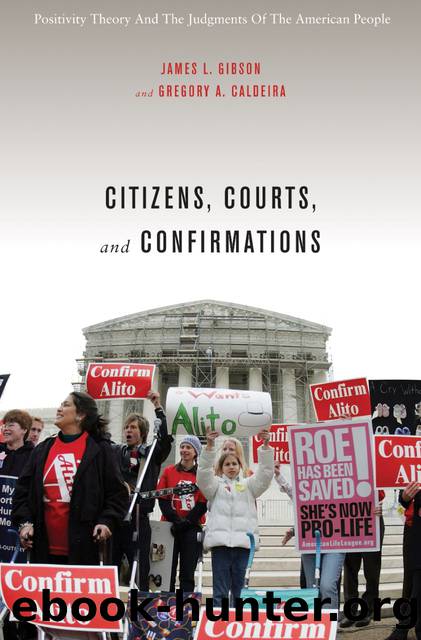Citizens, Courts, and Confirmations by Gibson James L.;Caldeira Gregory A.;

Author:Gibson, James L.;Caldeira, Gregory A.;
Language: eng
Format: epub
Publisher: Princeton University Press
Published: 2009-08-15T00:00:00+00:00
The Conditional Effect of Institutional Loyalty
The theory of positivity bias suggests that those with certain predispositions are likely to view confirmation disputes in particular ways. More specifically, those expressing strong attachment to the Supreme Court are likely to hold a distinct set of expectations of judges and are also predisposed to accept arguments by the nominee and her or his advocates about the importance of judiciousness, especially in contrast to policy preferences, ideology, and partisanship.
Testing this hypothesis requires that we develop a measure of loyalty to the U.S. Supreme Court, which of course we have produced in chapter 3, above. To recap, our measure of institutional loyalty is the conventional four-item index, and, conceptually, it varies from willingness to accept fundamental alterations in the structure and function of the institution to willingness to protect the integrity of the institution from disabling modifications.18 We have computed two such indices, one indicating the average response to the four statements and another simply counting the number of supportive responses. Moreover, we calculate these loyalty indices from two sources: the 2005 survey (i.e., loyalty measured prior to the Alito nomination), and loyalty measured contemporaneously with the Alito questions (i.e., in the 2006 survey). The former of course have stronger claims to causality, but the relationships are attenuated by any change that might have occurred between the two interviews. The latter indicators should be stronger predictors since they are measured at the same point in time, but owing to that factor, confidence in the causal inference is clouded. Table 4.9 reports the bivariate correlations between institutional loyalty and the role-expectation questions.19 From both sets of coefficients, perhaps we can get some purchase on the nature of the relationship.
Those who express loyalty toward the Supreme Court are more notable for what they do not emphasize than for what they do. The strongest correlations are negative. For instance, high institutional loyalty is associated with a lesser emphasis on the need for justices to represent the majority and to base their decisions on party affiliation (and to a lesser degree with giving voice to the citizenâs ideology). Also interesting is the complete lack of correlation between institutional loyalty and the markers of traditional mechanical jurisprudence judging: strictly following the law, respecting existing decisions, upholding constitutional values. As reported in table 4.9, the correlations between institutional loyalty and the index of expectations of judiciousness are also relatively weak (although statistically significant). To some degree, this reflects the lack of variance in these expectations, but these data nonetheless suggest a slight amendment to our thinking about the myth of legality: Institutional loyalty in this case seems to be distinctive less with regard to adopting a strong commitment to a mythical understanding of the role of the judge, and more with regard to the rejection of an explicitly political definition of what constitutes a good judge. To the extent this interpretation is correct, our argument that the primary message of controversy-based socializationâthat judges are different from politiciansâreceives at least some support from these data.
Download
This site does not store any files on its server. We only index and link to content provided by other sites. Please contact the content providers to delete copyright contents if any and email us, we'll remove relevant links or contents immediately.
| Antitrust | Civil Law |
| Emigration & Immigration | Federal Jurisdiction |
| Housing & Urban Development | Indigenous Peoples |
| Land Use | Public |
| Public Contract | Public Utilities |
| Urban, State & Local Government |
Killers of the Flower Moon by David Grann(3753)
Machine Learning at Scale with H2O by Gregory Keys | David Whiting(3644)
Oathbringer (The Stormlight Archive, Book 3) by Brandon Sanderson(2644)
Will by Will Smith(2581)
Once Upon a Broken Heart by Stephanie Garber(2529)
Guns, Germs and Steel by Diamond Jared(2203)
Borders by unknow(2119)
It Starts With Us (It Ends with Us #2) by Colleen Hoover(2046)
The Room Where It Happened by John Bolton;(2034)
Friends, Lovers, and the Big Terrible Thing by Matthew Perry(2005)
The Color of Law by Richard Rothstein(1821)
HBR's 10 Must Reads 2022 by Harvard Business Review(1698)
The Strength In Our Scars by Bianca Sparacino(1696)
A Short History of War by Jeremy Black(1672)
Water Rights and the Environment in the United States by John Burch(1607)
Examples & Explanations: Administrative Law by William F. Funk & Richard H. Seamon(1552)
515945210 by Unknown(1522)
Pharmacy Practice and The Law by Richard Abood(1495)
That Every Man Be Armed by Stephen P. Halbrook(1480)
